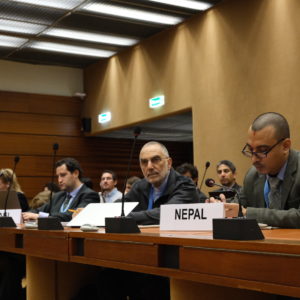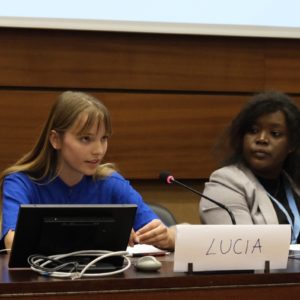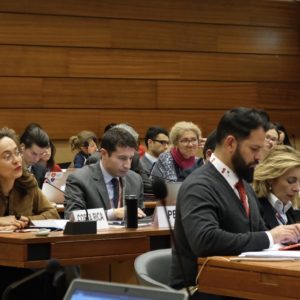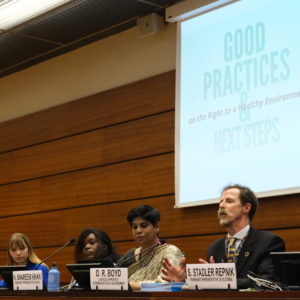Event Conference
HRC43 Side Event | Good practices on the Right to a Healthy Environment & next steps
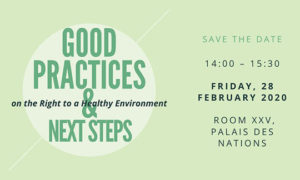
28 Feb 2020
14:00–15:30
Venue: Palais des Nations | Room XXV
Organization: Geneva Environment Network
On the occasion of the launch of the Special Rapporteur on human rights and the environment’s report to the 43rd session of the Council (A/HRC/43/53), this side-event to the 43rd session of the Human Rights Council was organized by the Special Rapporteur to discuss good practices of States in recognizing and implementing the right to live in a safe, clean, healthy and sustainable environment. The event was co-sponsored by the Geneva Environment Network.
About this Session
The side-event focused on introducing good practices and discuss how the accelerated diffusion and adoption of good practices will help protecting human rights in the era of multiple environmental crises. It also discussed the role of the Council in accelerating the universal recognition and enjoyment of the right to a healthy environment.
Agenda
Speakers
Angela Kariuki, Legal Officer, United Nations Environment Programme
David R. Boyd, UN Special Rapporteur on human rights and the environment
Lucia, Environmental Child Human Rights Defender
H.E. Amb. Sabina Stadler Repnik, Permanent Representative of Slovenia
Moderation: H.E. Amb. Nazhat Shameem Khan, Permanent Representative of Fiji
Summary
Discussion
Moderated by: Nazhat Shameem Khan, Permanent Representative of Fiji
- UN Special Rapporteur on human rights and the environment will be presenting his report at the 43rd session of the HRC
- Opportune time or missions and countries to hear about best practices on how particular countries protect this right, how the right can be translated from law to practices, what practices work and what might be replicated, as well as the extent to which the right is reflected in the legislative framework
David Boyd, UN Special Rapporteur on human rights and the environment
- Report on Monday to the HRC on good practices and the recognition and implementation of the fundamental human right to live in a safe, clean, healthy and sustainable environment
- Over 500 good practices from 175 states
- The recognition of the right to a healthy environment has been constitutionally guaranteed by 110 UN member states, while 101 states guaranteed it through environmental legislation and 125 states signed and ratified a regional human rights agreement mentioning this right – over 80% of UN member states already have a legal obligation to respect and protect this right
- Procedural components of the right to a healthy environment include access to information, public participation and access to justice
- Substantive components of the right to a healthy environment include clean air, safe climate, access to safe drinking water and sanitation, healthy and sustainable food, non-toxic environments, and healthy ecosystems and biodiversity
- Some examples to give a flavour of what states are doing:
- In terms of access to information:
- 12 states of the South Pacific Region came together to create an online information portal to provide data and information to the public
- Uruguay created a National Environmental Observatory which allows citizens to contribute information
- In terms of public participation:
- Norway and Finland put in place new mechanisms to make sure that the voices of the youth are heard in decision-making
- In terms of access to justice:
- Costa Rica tripartite system, composed of an Ombudsperson, a specialized environmental tribunal and a chamber of the Supreme Court of Costa Rica dedicated to protecting the right to a healthy environment
- In terms of clean air:
- Several countries are putting in place stricter regulatory measures
- In terms of safe climate:
- The Czech Republic, the United Kingdom and others have reduced their greenhouse gas emissions more than 30% since 1990
- Several countries committed to long-term decarbonization, specifically, the Marshall Islands put in place a human-rights-centred decarbonization plan
- Norway, Iceland, Paraguay, Uruguay and others get their electricity from 100% renewable energies
- In terms of safe drinking water and sanitation:
- Significant progress since the right to safe drinking water and sanitation was recognized by the HRC in 2010
- Paraguay’s rural population in 2000 had access to safe drinking water and sanitation in 50% of the cases, while today, it is 99%
- In terms of non-toxic environments:
- More than 50 countries banned all uses of asbestos
- Rwanda, Kenya and others are strongly tackling plastic pollution
- In terms of healthy ecosystems and biodiversity:
- Slovakia protected over 40% of its land
- Need to consider the rights of indigenous peoples when protecting ecosystems
- In terms of sustainable and healthy food:
- Several countries won awards for their transition to agro-ecology
- France banned all bee-killing pesticides
- In terms of access to information:
- Despite all these good practices from member states, what is being done is not enough
- “We need to do more, we need to do better”
- Recognizing the right to a healthy and sustainable environment will be the catalyst of this process
Sabina Stadler Repnik, Permanent Representative of Slovenia
- Progressive thinking is a basis for our humanity: this is how we progress, how we develop
- Environment is an area where we face a regression
- We are bombarded with negative news about the environment and we can do better
- Many health issues multiply because of environmental degradation
- We need positive examples and good practices because we need to have a closer look to what can be applied to our own national system
- Slovenia recognizes the right to a healthy environment in its constitution, as well as the right to safe drinking water, access to information and the protection on land and maritime environments
- Let me tell you a positive story about Lubjiana, Slovenia’s capital:
- Lubjiana is a green capital since 2016
- First European capital to commit to zero waste
- Recycling around 70% of the waste (10 years ago was 30%)
- Streets are cleaned with rainwater, biodegradable detergent and using electric vehicles
- Increase presence of zero waste shops
- Weekly workshops teaching people to reuse and repair
- Electric buses are being introduced and the old city is closed to the traffic
- City gardening and bee-keeping is increasing
- In Slovenia there is no Green Party, because people are conscious of the environment
- Need to invest in education to recycle, to respect the environment
- Time now to take a bigger step: the proclamation of the right to a healthy and sustainable environment
Lucia, Environmental Child Human Rights Defender
- We need to do more, yet the message does not seem to get through
- All the children are asking is the right to a healthy environment
- It makes me worry and angry how my future is being taken away from me, how many species have gone extinct and the fact that concrete action is still lacking
- What is stopping us from taking the next step?
- Time to take responsibility and act
- We must question our way of life
- When we demonstrate and strike, we are not doing it for us but for everybody
Angela Kariuki, Legal Officer, United Nations Environment Programme
- UNEP worked on the issue of human rights and the environment for decades
- This work has been strictly legal work in nature, but over last years become more high profile
- Human rights, development and, peace and security are interlinked and mutually reinforcing
- States are already implementing the right to a healthy environment, as shows SR Environment good practices report
- Cooperation between UNEP and UN OHCHR, leading to a partnership, a MoU and a joint work plan
- UNEP was invited to a retreat of HRC member states, furthering the relations with OHCHR
- Over last years the Council has called on UNEP to do more
- Working in silos is a common problem – not a good flow of information, need for more coordination – working better together is key
- This week various meetings co-organized by a series of parties discussed the situation of environmental human rights defenders, leading to the proposition of a Geneva Road Map.
- The purpose of UNEP is, not only to support member states, but also to protect people at the frontline of environmental conservation
- Through collaboration, sharing knowledge and innovation we can avoid breaking out of one silo to go right into the next
- We need a Road Map and a medium to navigate it: the recognition of the right to a healthy environment could be it
- UN SG in his Call for action at the opening of HRC43 made UN priorities on human rights and the environment very clear
- Nothing more powerful than the environment and human rights arms of the UN rowing fiercely in the same direction
Statements by member states and participants
Statement by Montenegro
- In its constitution, Montenegro is an ecological state and there is a legal recognition of a right to a healthy environment
- Three pillars in the National Development Plan: social, economic and environmental
- Sustainable Development Plan recognizing the horizontal nature of human rights
- Montenegro is an ecologically conscious partner, even though its impact is small
- Informing about good practices is essential
- Important three pillars of the Aarhus Convention: access to information, public participation and access to justice
Statement by Ecuador
- In its constitution, Ecuador recognizes the right to a healthy and sustainable environment
- Recognition of the substantive dimension of environmental rights as well as of the procedural dimension
- Marine environment is an area that has been neglected in MEAs in the past
- Now there is an emerging recognition of the role of marine environments in the fight against climate change and biodiversity loss
- Necessity of a comprehensive international agreement on marine environment
- What are your views on the development of an international agreement on marine protection?
- How can we encourage a rights-based approach in the NDCs that will be submitted later this year?
Statement by Switzerland
- Supportive of the Special Rapporteur on human rights and the environment
- What can we do, as individuals, to contribute to the fight against climate change and to the protection of the environment?
Statement by Costa Rica
- Good to hear the build-up of the doctrine and of the good practices
- Good that we brought the youth in the dialogue – broader perspective on why we are here and on what we need to do
- Costa Rica is looking forward in engaging in the process of recognition of the need for a human-centred approach to environmental conservation, including enhancing decision-making and raising awareness
- How can the different actors and partnerships (Geneva Road Map, core group, Special Rapporteurs, …) enhance action, cooperation and collaboration
Statement by Uruguay
- Uruguay supports a resolution recognizing the right to a healthy environment
- How do you think the new post-2020 SAICM framework on the sound management of chemicals and waste can contribute to the right to a healthy environment?
Statement by Peru
- Appreciates the positive narrative in highlighting good practices
- We focus sometimes too much on our shortcomings
- Peru recognized in its constitution the right to a healthy environment
- Peru will contribute to the next resolution on the subject, to be presented to the HRC
Statement by Monaco
- Important issue: Prince Albert II is very involved in environmental protection
- Very positive report, focusing on the good practices
- What is your expectation from the HRC and what do you expect from UN member states in the advancement of question of the right to a healthy environment?
Statement by Botswana
- Appreciates the positive narrative in highlighting good practices as well as the individual letter to member states highlighting the achievements and shortcomings of each country
- Botswana’s territory is 70% desert, yet the remaining 30% of the land has a share of protected areas that cover it for 40% of its size
- Reports such as this that are able to show the importance of environmental protection, mentioning examples from the international context
Statement by Guyana
- Guyana recognized the importance of this topic for a long time and the need for action
- In 1999, Guyana was a leader in the protection of the rainforest and of indigenous traditions and practices, with over 1 million acres protected
- In 2007, Guyana developed a Low Carbon Development strategy
- We commend UNEP in the context of PAGE (Programme of Action for a Green Economy), as the synergies called for in the presentation are already there in PAGE (UNEP + ILO + WB)
- Need to make it a practical realization, linking human rights, business needs and workers’ rights
- Emphasize the need for cross-sectorial as well as cross-agency interaction when translating human rights into action
Statement by iuventum
- Appreciates the report as the good practices can serve as an example for less virtuous countries to follow
- Quality of expertise is important: there should be a good support system to link academic institutions to agencies
Statement by the Maldives
- There is the need to recognize the right to a healthy environment
- Protecting the environment is essential for the Maldives, where climate change is a huge threat
- Good practices include raising awareness in the youth
- In its constitution, the Maldives recognize the right to a healthy and sustainable environment
- Commitment to ban single-use plastic before 2023
- The Maldives have a strong tourism industry with is interlinked with environmental protection, thus, environmental protection becomes an essential economic factor to take into account
Answer to statements and conclusion
David Boyd
- Answer to Ecuador
- Oceans have indeed been the forgotten half of the problem
- International negotiations ongoing on biodiversity beyond national jurisdiction
- Aichi target of 10% protection of the oceans
- Still huge problems with overfishing and illegal fishing
- NDCs are critically important in the Paris Agreements, but commitments are not ambitious enough – current trend is over 3°C increase
- From a rights-based perspective, we need more NDCs that follow this approach
- Answer to Switzerland
- A lot less airplane travel, more video-conferencing
- Dangerous to talk about only individual actions, need for a change of system
- Answer to Uruguay
- SAICM post-2020 is a critical issue
- Inadequate way of dealing with chemicals: only one at a time
- Need for more comprehensive and rapid ways of dealing with chemicals
- Additionally, some developed countries allow producers in the country to produce chemical products that are banned in the country for export purposes: this makes no sense
- Answer to Monaco
- Very short-term: need to recognize the right to a healthy environment as soon as possible
- Need for the recognition to be included in an international agreement, not only by HRC resolution
- First step, but very impactful one
- Follow the example of the right to safe drinking water and sanitation
- Answer to Guyana
- Interesting intervention
- Some states worry that the recognition of the right to a healthy environment will be an impediment to economic growth, in reality, it channels development towards sustainable investments and green jobs, without the negative externalities of non-green growth (solar and wind energy, environmental restoration, …)
- Answer to the Maldives
- Small island developing states are at forefront of climate change
- Very emotional first visit in Fiji, where impacts of climate change are tangible
- Developed countries need to do much more, in terms of emissions’ reduction, assistance on adaptation and loss and damage financial contributions
Sabina Stadler Repnik
- Proclamation of the right to a healthy environment would be a good step per se
- Good practices are essential, and are the core of multilateralism
- It is about individual actions, but more importantly about international efforts to protect the environment
- Human beings are envious, we should be competing to be the best in the environmental field as well
Angela Kariuki
- There are so many initiatives and our goal is to map them
- The next step is a plan of action to mutually strengthen each initiative
- Need for the environmental and human rights dimensions of the UN to come together and share information
Lucia
- Our system and way of life need to change to have meaningful change
- Little actions help, but are not decisive
Documents
Video
The event was live on Facebook.
Photos
Photos © UNEP/GEN





